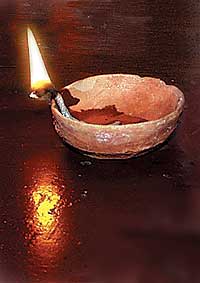 I had known Major Mohan Khatri for nearly two years, but I can't claim that I was close enough to be a friend. We knew each other, but the bond hadn't deepened with either shared interests or sharing of ideas and opinions over a period. The late Major Khatri wasn't related to me through blood, business, social association, or old school ties. Perhaps the only commonality I can claim with him was our endeavour to be "concerned citizens" in our own ways.
I had known Major Mohan Khatri for nearly two years, but I can't claim that I was close enough to be a friend. We knew each other, but the bond hadn't deepened with either shared interests or sharing of ideas and opinions over a period. The late Major Khatri wasn't related to me through blood, business, social association, or old school ties. Perhaps the only commonality I can claim with him was our endeavour to be "concerned citizens" in our own ways. The Major, for that's what we all called him even though he had retired from the army seven years ago, ran a tourist resort. He had so much self-confidence that he never felt the need to show it. He believed that future leaders of national institutions badly needed some hard training in team building and risk-taking.
 Perhaps it was his faith in the future of our country that made me respect him so much when he was alive. And forced me to grieve when he was mercilessly murdered by Maoists during Dasain.
Perhaps it was his faith in the future of our country that made me respect him so much when he was alive. And forced me to grieve when he was mercilessly murdered by Maoists during Dasain. In a macabre sense, it is comforting that death of single person can still make you weep. The daily death toll announced over the media has numbed our senses, and we tend to blank out when the statistics come out in the evening news. But when it's a name, it hits you. And when it's a name you know and admire, it shocks.
All kinds of deaths have become routine over last seven years. When the government repeatedly failed to protect the life and liberty of its citizen, and Maoist mayhem spread almost all over the country, our confidence in the ability of the government died a slow, painful, death. The sanctity of monarchy suffered a severe blow on 1 June, 2001.
Sher Bahadur Deuba killed our faith in parliamentary democracy on 22 May, 2002 by his midnight dissolution of the lower house of the parliament. And then another midnight announcement on Friday the Fourth last month, this time from the king himself, declared the passing away of the sovereignty of the people.
Mahakal, the deity of death and destruction, is performing his Tandava in Nepal without bothering to take a break.
But there was always the hope that the destruction will stop some day, and a spurt in creativity will begin soon after. In many ways, Major Khatri was one of the symbols of such hope. He was a person who dared to light a lamp rather than continue with the pointless game of cursing the darkness. It is this realisation that makes Mohan Khatri's passing away even more painful. There is no tragedy bigger than the death of hope, and the demise of dreams is the worst fate that can befall a society.
Major Khatri, were he alive, would have respectfully, but strongly, disagreed with such a suggestion. He was a doer, believing in tackling fate rather than taking it lying down. Mourning was not his style, at least not public mourning. I can almost hear his reproach, "Bemoaning helplessness serves no purpose at all. The media must raise hopes during the time of despair." It's easier said than done, no doubt, but perhaps the importance of that suggestion is even more in the enveloping darkness.
Maoists are escalating their violent campaign. The political parties are back to their favourite game of word-wars. The economy suffers deep trauma. Donors, as usual, sit on the sidelines passing sanctimonious judgement. How deep do we have to sink before hitting the bottom and coming back to our senses? There is a frightening realisation as we hurtle into the unknown: nothing has changed since 4 October.
Voltaire said: "I fear that in this world one is reduced to being either hammer or anvil, lucky the man who escapes these alternatives!" I shall light a lamp in the memory of Major Khatri this Tihar-in memory of his faith, with reverence for his courage, but most of all, in celebration of the hopes that he had for this country. Dreams die, but at festival time we are reminded of their inescapable rebirth.



